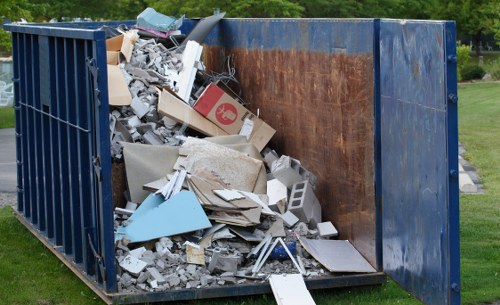Construction Waste Disposal in Hatch End

Construction projects, whether large or small, generate a significant amount of waste that needs to be managed efficiently. In Hatch End, effective construction waste disposal is not just a regulatory requirement but also a crucial aspect of sustainable development. Proper waste management ensures that construction sites remain safe, environmentally friendly, and compliant with local laws.
The growing awareness of environmental issues has led to stricter regulations regarding construction waste. Builders and contractors in Hatch End must stay informed about the best practices and available services to handle their waste responsibly. This article delves into the various aspects of construction waste disposal in Hatch End, providing valuable insights for professionals and homeowners alike.
Understanding the types of construction waste is the first step towards effective disposal. From concrete rubble to excess materials like wood, metal, and plastics, each type of waste requires specific handling methods. By categorizing waste appropriately, disposal becomes more efficient and environmentally sustainable.

Types of Construction Waste
Construction waste can be broadly categorized into several types, each requiring different disposal methods:
- Concrete and Masonry: These are among the most common types of construction waste, resulting from demolition or construction projects.
- Wood and Timber: Excess wood from framing, decking, or other construction activities contributes to this category.
- Metals: Scrap metals like steel, aluminum, and copper are frequently generated on construction sites.
- Plastics and Packaging: Packaging materials, plastic sheeting, and other plastics used in construction are included here.
- Hazardous Waste: Materials such as asbestos, lead-based paints, and certain chemicals require special handling and disposal.
Each category presents unique challenges, making it essential to adopt tailored disposal strategies. Proper segregation of waste at the source can significantly enhance the efficiency of the disposal process.

Regulations and Compliance
Compliance with local regulations is paramount in construction waste disposal. Hatch End falls under Greater London Authority's jurisdiction, which has set specific guidelines to manage construction waste effectively. Non-compliance can result in hefty fines and project delays, making adherence to regulations a top priority for all stakeholders.
Key Regulations to Consider
- Waste Management Licensing: Depending on the volume and type of waste, specific licenses may be required for disposal.
- Environmental Protection: Ensuring that waste disposal methods do not harm the environment is crucial.
- Recycling Mandates: Certain materials must be recycled, reducing the overall environmental footprint.
- Health and Safety Standards: Proper handling of hazardous waste ensures the safety of workers and the community.
Staying updated with the latest regulations and incorporating them into project planning can streamline the waste disposal process and prevent legal complications.

Effective Waste Management Strategies
Implementing effective waste management strategies can significantly reduce the environmental impact of construction projects in Hatch End. Here are some best practices:
- Source Segregation: Separating different types of waste at the site improves recycling efficiency.
- Recycling and Reuse: Materials like metals, wood, and plastics can be recycled or reused in other projects, minimizing waste.
- On-site Waste Sorting: Having designated areas for different waste types facilitates easier collection and disposal.
- Partnering with Local Waste Disposal Services: Collaborating with reputable local services ensures compliance and efficient waste management.
- Training and Education: Educating workers about proper waste handling can reduce contamination and improve overall waste management.
Adopting these strategies not only benefits the environment but also enhances the efficiency and cost-effectiveness of construction projects.

Choosing the Right Waste Disposal Service
Selecting a reliable waste disposal service is critical for managing construction waste effectively in Hatch End. Consider the following factors when making your choice:
- Compliance with Regulations: Ensure the service provider adheres to all local waste disposal regulations.
- Recycling Capabilities: Opt for services that prioritize recycling and environmentally friendly disposal methods.
- Range of Services: Comprehensive services, including collection, sorting, and disposal, can streamline the entire waste management process.
- Reputation and Reviews: Researching customer feedback and industry reputation can help in selecting a trustworthy provider.
- Cost-effectiveness: Compare pricing structures to find a service that fits your budget without compromising quality.
By carefully evaluating these aspects, construction professionals in Hatch End can choose a waste disposal service that meets their specific needs and promotes sustainable practices.
Innovative Technologies in Waste Disposal
The construction industry is continually evolving, with new technologies enhancing waste disposal methods. Innovations such as waste tracking software, on-site recycling equipment, and advanced sorting mechanisms contribute to more efficient and sustainable waste management.
Implementing these technologies can lead to better resource utilization, reduced waste, and lower disposal costs. Staying abreast of technological advancements ensures that construction projects remain competitive and environmentally responsible.
Environmental Impact of Improper Disposal
Improper construction waste disposal can have severe environmental consequences. Landfills become overloaded, leading to increased greenhouse gas emissions and soil contamination. Additionally, hazardous materials can leach into water sources, posing risks to human health and ecosystems.
By prioritizing proper waste management, construction projects in Hatch End can mitigate these negative impacts, promoting a healthier and more sustainable community.
Future Trends in Construction Waste Management
The future of construction waste disposal is leaning towards greater sustainability and circular economy principles. Trends include increased recycling rates, the use of biodegradable materials, and the adoption of zero-waste construction practices. Embracing these trends will not only benefit the environment but also enhance the reputation and efficiency of construction businesses.
Investing in sustainable waste management now prepares the industry for future challenges and opportunities, ensuring long-term viability and success.
In conclusion, construction waste disposal in Hatch End is a multifaceted issue that requires careful planning, adherence to regulations, and the adoption of best practices. By understanding the types of waste, complying with local laws, implementing effective management strategies, and choosing the right disposal services, construction professionals can minimize their environmental impact and promote sustainable development.
Contact us today to learn more about our construction waste disposal services in Hatch End and how we can help you manage your project’s waste efficiently and responsibly.